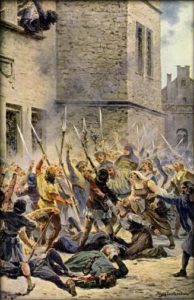1419
600th Anniversary of the First Defenestration of Prague
To defenestrate is to throw something out the window. Czech history gives us several examples of people being thrown out of windows, the earliest of these occurring on 30 July 1419.
The Czech lands were in religious turmoil early in the fifteenth century. Proto-protestant doctrines of John Wycliffe had been imported from England and aroused unhappiness with the state of the Church. As expounded by preacher Jan Hus these new ideas also took on a nationalistic gloss, setting Czech sentiments against a perceived Germanic dominance in politics and culture. When Hus was burnt in 1415 by the Council of Constance, despite an imperial safe-conduct, talk of violence became more common.
In July 1419 the Prague city council had arrested some Hussites and refused to give them up to a mob demanding their release. Led by radical priest Jan Želivský, the crowd stormed the Town Hall and threw a judge, a burgomaster, and several councillors out the window. Those who survived the fall were killed by the Hussite mob below. This is often identified as the first act in what became known as the Hussite Rebellion, a religious civil war that lasted into the 1430s.
Other defenestrations at the Town Hall occurred in 1483 and 1618. In 1948 Czechoslovakian foreign minister Jan Masaryk was assassinated by being thrown out of the window of a government building.
The Czechs made a 2019 festival out of the 600th anniversary with medieval jousts, a Hussite camp, a play, and a councillor being thrown out of a window.
